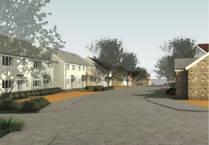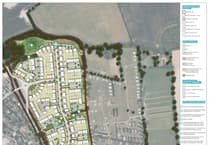PLANS for a modern home to be built into a hillside overlooking the sea in South East Cornwall have been rejected after councillors decided it would be overdevelopment.
Trevor Farrell had applied to Cornwall Council to build the detached property on a site in Brenton Road, Downderry. Previous plans for a property had been refused by the council after officers felt that they were out of scale with other buildings in the area.
However, the resubmitted plans had been changed so that the proposed new home would be built into the hillside, giving it a “sunken nature”. The application went before Cornwall Council’s east sub-area planning committee when it met on Wednesday morning (January 5).
Planning officers had recommended that the plans should be approved saying that the changes had helped to reduce its impact on the site which is in an Area of Great Landscape Value.
The plans would see the home set across three tiers with the upper level providing parking space and an entrance to the two lower levels.
A middle section would have the living areas with lounge, kitchen and a terrace with swimming pool while the bottom section would have bedrooms. The front of the building would have extensive glazing giving views across the sea.
Deviock Parish Council had objected to the application saying that the proposed home would be “overbearing and dominate the hillside”.
Mark Gibbons, chair of the parish council, told the planning committee that the proposal was “another huge private mansion, a second or third home perhaps”.
An agent representing applicant Mr Farrell said that the amended design of the home would “incur considerable cost” to his client so that they would meet requirements. He said that the impact would be reduced significantly due to the redesign with all the levels of the property sunk within the hillside.
Local Cornwall Councillor Armand Toms also raised objections to the plans, saying he was concerned about additional traffic in the area as well as the size of the proposed new home. He said he was also concerned about the possibility of landslips in the area and whether the proposed home would be safe.
Committee member Jennifer Cruse said that she felt that the character of the area had already been harmed by previous developments.
She said: “The building next to it, in my opinion, is hideous - a real eyesore. The designer here has made a real effort to make the proposed property fit into the hillside and be less obvious. You won’t see it from the beach.”
But she said that the “whole area has been overdeveloped”, adding: “It is really sad as there were kestrels flying around. It would have been a wonderful place but it seems to have already been ruined - that is my opinion.”
Adrian Parsons said that he was “not convinced” that enough had changed from the original rejected proposals for the plans to be approved.
He said he could understand the changes to make it “pretty much a bunker, hidden in the hillside” but he felt it would still dominate the area.
Cornwall Councillor Andrew Long picked up on the issue of landslips highlighted by Cllr Toms and said that the council should be taking into account coastal erosion when deciding whether planning permission should be granted for developments.
The Mebyon Kernow councillor commented, after planning officers said that guidance was still being drawn up for how to address concerns about climate change in planning decisions: “I am really concerned that I do not think that we, as a council, are taking - actually taking - notice properly of the environmental situation and the climate emergency that we are now in.
“I don’t think we should be waiting and waiting for a statement from our chief planning officer - we should be dealing with it now as an environmental crisis is continuing. I don’t blame the officers for that, it is the system as a whole that allows that.”
Cllr Long said that the reasons for refusing the original application still applied and proposed that the application be refused. That was agreed with eight votes in favour of refusal and two against.



.png?width=209&height=140&crop=209:145,smart&quality=75)
